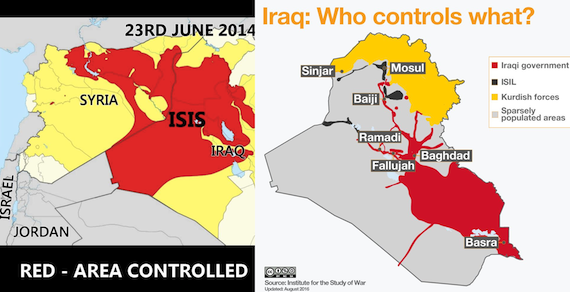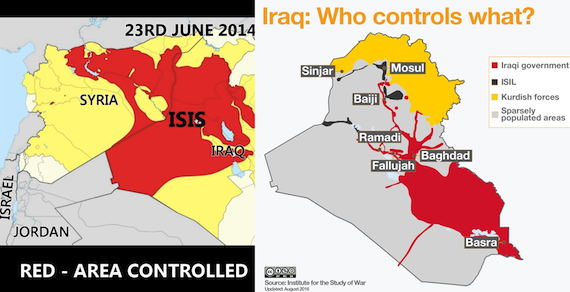By Juan Cole | (Informed Comment) | – –
As Josh Rogin pointed out, Donald Trump’s pronouncement that the Mosul campaign is bound to fail is an affront to the Iraqi and US troops risking their lives against Daesh (ISIS, ISIL). It is also just plain wrong, and the terms of his pronouncement show once again that he doesn’t have the slightest idea of what he is talking about. The big problem is not that the Mosul campaign will fail. It is that the success may be poorly managed.
The attack on Mosul is turning out to be a total disaster. We gave them months of notice. U.S. is looking so dumb. VOTE TRUMP and WIN AGAIN!
— Donald J. Trump (@realDonaldTrump) October 23, 2016
Trump’s notion that the United States gave Daesh “months notice” of the present campaign is bizarre. Daesh had two years notice, and it was unavoidable. Daesh took Mosul in June of 2014, then took major cities in al-Anbar and Salahuddin provinces, along with some territory in Diyala.
Right from that point, the Iraqi government and the Obama administration vowed to take all those cities back for the Baghdad government. Tikrit was taken by the government in spring 2015. Then this year Ramadi was taken and Fallujah and the rest of al-Anbar Province. Once all of al-Anbar and Salahuddin fell to the government forces and their paramilitary auxiliaries, it was clear that Baghdad and its allies would reconquer Ninewah Province and its capital, Mosul. How the steady progress of the campaign against Daesh could have been hidden from the latter is completely mysterious. If you were Abu Bakr al-Baghdadi, all you had to do was watch that progress unfold from Mosul and you would know they were coming for you.
Given that Obama’s intervention stopped Baghdad and Erbil from falling to Daesh in 2014 and then US support helped Iraq take a whole string of cities back thereafter, it is hard to understand why the US is looking dumb. Obama did all this even though the Iraqi army had collapsed and the reestablished US command in Iraq had to retrain and rebuild it. The effort also benefited from the courage and sacrifices of the Kurdish Peshmerga (‘those who stand before death’) and of Iraq’s militias, especially the Shiite ones but also including Christian and Sunni paramilitaries who have taken part in the campaign.
So the big red blob on the left is what Daesh had in Iraq as of summer, 2014. The thin little black blobs and lines are what Daesh still has as we speak. And after a couple of months they will be gone.
Since the Iraqi forces defeated Daesh in Ramadi and Fallujah, there is no real reason to doubt that the Mosul campaign will succeed. The Iraqi 9th Armor division is buttressed by three crack Iraqi Special Operations Forces Brigades. It is supported from the north by the Kurdish Peshmerga, which defeated Daesh in Sinjar. The Iraqi Shiite militias, while problematic in many ways, can’t be accused of being fainthearted. You put those ground forces together with US and other air support, against a small guerrilla force of perhaps 7,000, and the outcome is not really in doubt. Of course, Daesh is a specialist in booby traps and surprise attacks, and it is possible that the Iraqi national forces could get bogged down for a while before going in for the kill.
One question is whether civilian casualties can be kept to a minimum. Trump is uninterested in this issue. He favors carpet bombing, which would produce mass casualties.
Another question is how much of the physical plant of the city of Mosul can be preserved in the fierce fighting. That issue will matter to the families who ultimately return to live in their homes. It affects the destiny of 2 million people.
Yet another question is whether the Shiite-dominated government of Haydar al-Abadi is capable of reaching out to Mosul after the campaign and incorporating Mosul and other Sunni Arab areas back into Iraq. Strong Iraqi nationalists among the Sunni Arabs, such as Atheel al-Nujayfi (the governor of Ninewah Province chased out by Daesh in 2014) have begun talking about the possibility of a Sunni Arab secession from Iraq (or if you count 2014, a second secession).
The answers to these three questions are unknown and are crucial for the future of Iraq. They are the questions a presidential candidate should be asking, instead of making feckless predictions of defeat that are not even plausible.




 © 2025 All Rights Reserved
© 2025 All Rights Reserved